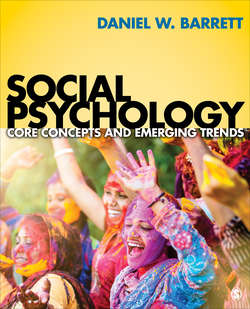Читать книгу Social Psychology - Daniel W. Barrett - Страница 138
На сайте Литреса книга снята с продажи.
Biased Evaluation of Information
ОглавлениеPeople’s motivations can influence not only searches for new information but also the evaluation of existing information. Vallone, Ross, and Lepper (1985) exposed research participants to news videos reporting the killing of civilians by Israeli soldiers in a refugee camp in the Middle Eastern nation of Lebanon in 1982. Students who were already pro-Arab perceived the news reports to be biased against Arabs, whereas pro-Israeli students interpreted the reports as biased against Israelis. In each case, participants held preexisting beliefs that the media were biased against their own opinions and perceived the news stories as confirming that media bias. Of course, sometimes the media really are biased in its reports of world events, such as in the case of the 2002 Olympic skating controversy, discussed above (Stepanova et al., 2009). More generally, sometimes people will interpret information in ways that make that information appear to support their own perspectives (Greitemeyer, Fischer, Frey, & Schulz-Hardt, 2009; Mojzisch, Grouneva, & Schulz-Hardt, 2010). For instance, viewers of presidential debates overwhelmingly believe that their favored candidate “won” against an opponent (Kinder & Sears, 1985).
Such biased assimilation—the interpretation of information so that it seems similar to or consistent with one’s preferred perspective—occurs even when people are evaluating purportedly scientific evidence. Lord, Ross, and Lepper (1979) provided pro- and anti-capital punishment participants with two studies, one which supported the deterrent effects of capital punishment and one that demonstrated the opposite. The “pro” individuals assessed the “pro” study as more valid than the “anti” study, whereas the “anti” students evaluated them in the opposite way. This occurred despite the fact that the researchers controlled for differences in the methodologies between the studies: Whichever study participants disagreed with was more strongly criticized. Even psychologists are not immune to such biased thinking, at times evaluating the validity of research results in a manner consistent with their own preferred explanations (Hergovich, Schott, & Burger, 2010). Think about the ongoing debate about whether the death penalty reduces crime rates . . . how do you suppose advocates on each side evaluate evidence that contradicts their perspectives?
As you can see, people often engage in motivated reasoning that results in the gathering and/or evaluation of evidence so that it appears consistent with what they want to believe. In later chapters, we’ll extend our discussion of the effects that motivations, feelings, and goals have on many other social psychological processes, including how we determine the causes of social behavior, susceptibility to social influence, and perceptions of other groups. For now, let’s turn our attention to another key influence on our reasoning processes: culture.
Biased Assimilation: Construing information so that it seems similar to or consistent with one’s preferred perspective
